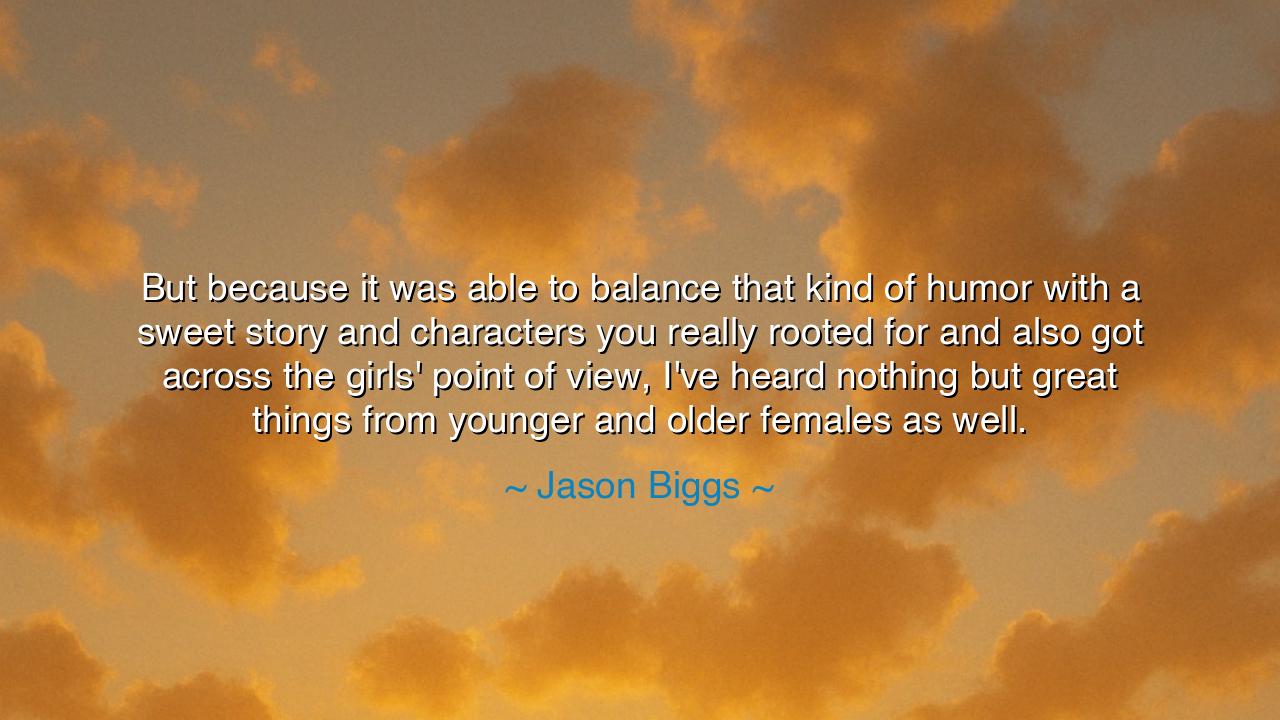
But because it was able to balance that kind of humor with a
But because it was able to balance that kind of humor with a sweet story and characters you really rooted for and also got across the girls' point of view, I've heard nothing but great things from younger and older females as well.






The words of Jason Biggs—“But because it was able to balance that kind of humor with a sweet story and characters you really rooted for and also got across the girls’ point of view, I’ve heard nothing but great things from younger and older females as well”—speak of a rare and noble harmony within the art of storytelling. Beneath their simplicity lies a truth as old as creation itself: that balance is the soul of beauty, and that even humor, when tempered by heart and humanity, becomes not mere jest, but revelation. Biggs, an actor known for works that blend comedy with emotional truth, reminds us that stories endure not through laughter alone, but through their power to touch what is tender and true within us.
At its heart, this quote celebrates the union of laughter and compassion, of humor and empathy. It honors the idea that the best art does not live in one emotion but walks gracefully between many. The story he speaks of—likely drawn from his experience in American Pie and its kindred works—was not confined to crudeness or surface humor. Rather, it succeeded because beneath its jokes lay warmth, sincerity, and the beating heart of characters who felt real. The sweet story softened the laughter, while the humor gave lightness to the sweetness. This is the ancient balance all great storytellers seek—the ability to make one smile while secretly opening the door to understanding.
In the ancient theatres of Greece, the playwrights knew this secret well. After every tragedy came a satyr play—a brief comedy meant to cleanse the heart after sorrow. The people understood that joy and pain must coexist, that laughter and tears are siblings born from the same truth. Aristophanes, the great comic poet, filled his plays with political satire and vulgar jest, yet hidden within the laughter was a yearning for justice and peace. Likewise, Jason Biggs’s reflection reminds us that humor alone cannot nourish the soul; it must be anchored in humanity. When comedy honors the emotions of its characters, when it includes the point of view of all people—men and women alike—it transcends mockery and becomes art that unites.
The origin of Biggs’s insight lies not merely in his craft, but in the awakening of an age. The early comedies of his generation often leaned heavily on male perspectives, on laughter at the expense of understanding. But the story he describes broke that mold—it gave voice to the feminine experience, showing that even in humor, there is room for compassion, equality, and perspective. By capturing both sides of the human story—the laughter and the longing—it won the hearts of “younger and older females” alike. What he praises, then, is not just the success of a film, but the triumph of balance: the ability of art to reflect every soul it touches.
Consider the example of Jane Austen, who lived long before modern cinema, yet understood the same principle. Her novels are filled with wit, irony, and laughter—but always bound by tenderness, by truth, by the sweet story of human folly redeemed by love. In Pride and Prejudice, the humor does not mock for cruelty’s sake; it reveals the absurdities of pride while honoring the dignity of the heart. It was her balance—her ability to see both the ridiculous and the profound in life—that allowed her works to endure across centuries. Just as Biggs describes, Austen gave voice to women, showing that their laughter could be wise, and their sweetness could be strong.
The lesson hidden in Biggs’s words is timeless: whether in art, in speech, or in life, seek balance. Let your laughter be kind, your storytelling sincere, your joy grounded in empathy. Do not let humor become cruelty, nor sweetness become weakness. For it is in the weaving together of light and depth, jest and justice, that true beauty is born. The artist who honors both wins not only applause but affection, because people see themselves—not as ideals, but as whole beings, capable of laughter and love alike.
Let this truth echo across generations: the greatest art mirrors the wholeness of humanity. It makes us laugh without shame, cry without despair, and think without judgment. In the theater of life, we are all both comedians and dreamers, both jesters and pilgrims. To understand this balance is to live with grace—to root for others as for the characters of a story, to see through their eyes, to honor their experience.
So remember the wisdom behind Jason Biggs’s words: humor is sweetest when joined with heart, and art is strongest when it speaks for all. In your work, your laughter, and your love, seek that harmony. For when you can move others to laughter and, in the same breath, to compassion—you will have found the eternal rhythm that makes stories endure and souls connect.






AAdministratorAdministrator
Welcome, honored guests. Please leave a comment, we will respond soon